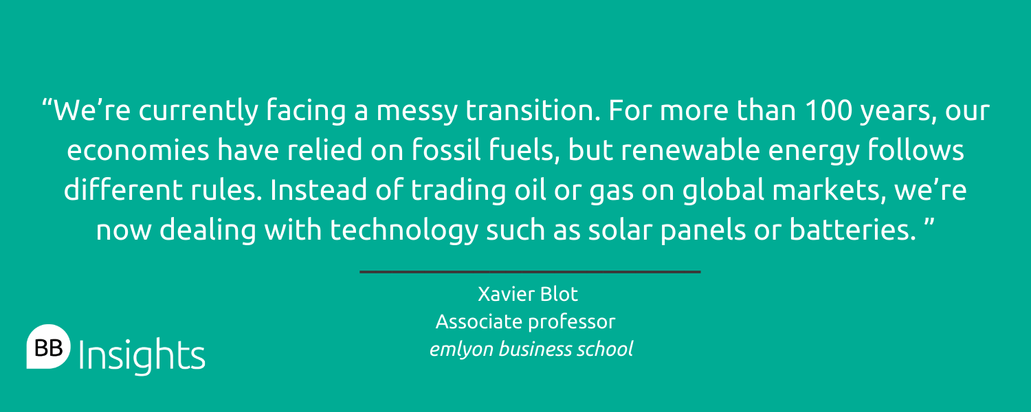Energy sits at the heart of virtually every aspect of modern life—from the electricity powering our homes to the data centers enabling AI.
With more than 90% of new power capacity in 2024 coming from renewables, it’s become apparent that the way we produce and use energy is changing.
So, why should future business leaders pay attention to the energy transition—and how can business school help them prepare?
That’s a question BusinessBecause put to Xavier Blot and Thibaud Voïta from emlyon business school.
Why understanding energy matters for business leaders
While discussions surrounding the energy transition often focus on technical solutions such as solar panels or wind turbines, business skills are just as essential to putting those solutions into practice.
That’s because no matter how innovative a technology is, it still needs funding, regulation, and a viable business model to succeed. This is as true for renewable energy infrastructure as it is for emerging technologies more broadly.

AI, for example, depends on large data centers that need high quantities of electricity.
“If we want AI to grow in a sustainable way, we need energy systems that are reliable, efficient, and low-carbon,” explains Xavier (pictured), associate professor and co-director of the program.
At emlyon business school, the Master of Science (MSc) in Management of Energy Transitions is designed for professionals who want to develop the skills to lead within this changing energy landscape.
On the program, students develop a foundational understanding of energy systems while also building practical business skills in areas such as project finance, carbon strategy, and risk management.
“The goal isn’t to become an engineer at the end of the program, but to really get a sense of how energy systems work together, and how you can combine different building blocks to design energy solutions,” says Xavier.
Students also work towards certifications in project management, financial auditing, and carbon footprint assessment, giving them practical tools they can apply directly in their future careers.
“We don’t want students to become strategists hidden away in an ivory tower. We want them on the field, ready to lead projects and deploy infrastructure,” he says.
For Thibaud, advisor at the Jacques Delors Institute and program co-director, strong business skills become even more important when managing large-scale international projects.
“Energy projects are large, international, and often politically sensitive. You might be managing a wind farm in Denmark, hiring Chinese contractors, sourcing parts from Korea, working with a US engineering firm, and negotiating with the local government and community.
“On the program, students learn how to handle the technical, political, cultural, and financial challenges that come with real-world projects,” he says.
How business school prepares you to lead the energy transition
Fossil fuels still dominate global energy supply because they’re reliable and available on demand. However, they’re also increasingly risky, with fluctuating prices, political tensions, and tougher environmental regulations.
Renewables such as wind and solar are cleaner and often cheaper, but they depend on weather, storage, and infrastructure that many regions are still developing.

“We’re currently facing a messy transition. For more than 100 years, our economies have relied on fossil fuels, but renewable energy follows different rules. Instead of trading oil or gas on global markets, we’re now dealing with technology such as solar panels or batteries,” says Xavier.
This transition informed the design of the MSc, with a focus on the skills and knowledge employers are prioritizing, Thibaud (pictured) explains.
“We spoke with recruiters, utilities, and think tanks to understand not only what skills are in demand today, but what will be needed five years from now. We wanted to make sure our students graduate ready for the challenges companies are just beginning to face,” he says.
Throughout the year, students apply their knowledge through company projects and sector-specific case work. One of the highlights is a four-day innovation challenge and conference, where students work with peers, faculty, and external experts to develop solutions to existing energy problems.
“We don’t treat students as students, but as future leaders and collaborators who can contribute to the sector,” says Xavier.

Energy is a global business
The energy transition looks different around the world. To help students understand and navigate these differences, the program—otherwise based in Paris—includes an international term in Shanghai.
China is the world’s leading producer of solar panels, wind turbines, and batteries, making it central to the global energy conversation. During the Shanghai term, students take part in company projects, intercultural management courses, and discover the sectors shaping China’s energy future.
“China holds around 90% of global production capacity in some renewable sectors. No matter which part of the energy transition you work in, you’ll need to understand China’s role. There’s no way around it,” says Thibaud.
Living and studying in Paris also provides a strong professional advantage. With global energy firms and cleantech startups headquartered in the city, students are well-positioned to build industry connections and tap into local opportunities to grow their careers.
The energy transition is one of the defining business challenges of our time. For students who want to work at the intersection of strategy, sustainability, and global impact, understanding how energy systems are evolving and how to lead within that change can be a strong place to start.




